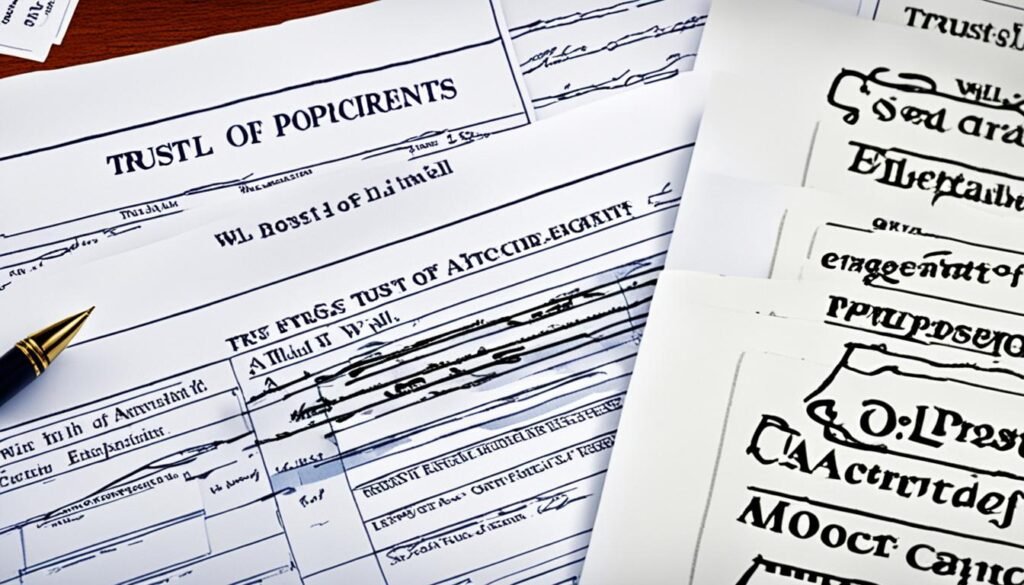Estate planning is a crucial aspect of financial management that involves making detailed plans for the transfer of your estate after your death. It ensures that your assets are distributed according to your wishes, minimizes estate taxes and legal fees, and protects your loved ones from unnecessary financial burdens. To create a solid estate plan, it is important to consider hiring an estate planning attorney or lawyer who specializes in estate planning services. They will assist you in preparing the necessary estate planning documents, such as a will and any additional trusts or powers of attorney that may be needed.
Key Takeaways:
- Estate planning is essential for protecting your wealth and ensuring your assets are distributed as per your wishes.
- Hiring an estate planning attorney or lawyer specialized in estate planning services is crucial for creating a solid estate plan.
- Properly preparing estate planning documents like a will and trusts is essential for minimizing estate taxes and legal complications.
- An estate planning attorney or lawyer can guide you through the complexities of estate planning and ensure your plan is legally sound.
- Seeking professional guidance and having open conversations with your family are key to creating the best estate plan possible.
The Importance of Estate Planning
Estate planning is essential for everyone, regardless of the size of their estate. It goes beyond financial assets and includes making important decisions about healthcare and appointing someone to make decisions on your behalf if you become incapacitated. The importance of estate planning lies in protecting your legacy, ensuring your loved ones’ financial security, and avoiding legal complications. To ensure a successful estate plan, it is important to follow estate planning tips and have a comprehensive estate planning checklist to guide you through the process.
Protecting Your Legacy
One of the key reasons why estate planning is important is to protect your legacy. By creating a well-thought-out estate plan, you can ensure that your assets are distributed according to your wishes. Whether it’s passing down a family heirloom or leaving a charitable bequest, estate planning allows you to control how your legacy is preserved and passed on to future generations.
Ensuring Financial Security
Another crucial aspect of estate planning is ensuring the financial security of your loved ones. Through estate planning, you can designate beneficiaries and establish trusts to safeguard their future. This can include providing for your spouse, children, or other dependents financially. By having a comprehensive estate plan in place, you can reduce the financial burden on your loved ones and give them peace of mind knowing that their future is secure.
Avoiding Legal Complications
Estate planning also helps minimize legal complications that can arise after your passing. Without a proper estate plan, your assets may be subject to probate, which can lead to lengthy legal processes and potentially result in disputes among family members. By having a clear plan in place, you can avoid unnecessary delays, reduce the likelihood of litigation, and ensure that your wishes are carried out without any legal setbacks.
It is important to remember that estate planning is a continuous process that requires regular review and updates. Life circumstances, such as marriage, divorce, births, or significant financial changes, may necessitate adjustments to your estate plan. Consulting with an estate planning attorney or lawyer can provide you with valuable guidance and ensure that your estate plan remains up to date and addresses your specific needs.
By understanding the importance of estate planning, following estate planning tips, and having a comprehensive estate planning checklist, you can take control of your financial future and make informed decisions that will benefit both you and your loved ones.
Key Elements of Estate Planning
In order to create a comprehensive estate plan, there are several key elements that you need to consider. These elements play a crucial role in ensuring that your assets are properly managed and distributed according to your wishes. Let’s explore each of these elements in detail:
1. Wills and Trusts
A will is a legal document that outlines your wishes for asset distribution after your passing. It allows you to specify who will inherit your property, money, and other assets. Additionally, wills also allow you to name guardians for minor children, ensuring their well-being under your chosen care. On the other hand, trusts are legal arrangements that can help you manage and protect your assets during your lifetime and after your death. They offer greater flexibility and privacy compared to wills and can also help minimize estate taxes.
2. Probate Process
The probate process is the legal process through which a deceased person’s will is validated, their assets are gathered, debts are paid, and remaining assets are distributed to heirs. Having a clear understanding of the probate process can help ensure a smoother estate administration and minimize potential delays and disputes.
3. Estate Tax Planning
Estate tax planning involves implementing strategies to minimize estate taxes and maximize the amount of your assets that can be passed on to your loved ones. By employing various legal and financial strategies, such as gifting, creating trusts, and establishing tax-efficient structures, you can reduce the burden of estate taxes on your estate.
4. Power of Attorney
A power of attorney is a legal document that allows you to appoint someone to make financial and legal decisions on your behalf in the event that you become unable to do so yourself. It is important to choose a trusted individual who will act in your best interests and ensure that your affairs are properly managed.
5. Living Wills
A living will, also known as an advance healthcare directive, is a legal document that outlines your medical preferences and treatment instructions in case you become incapacitated and unable to communicate your wishes. It allows you to specify the extent of medical intervention you desire, such as life support or resuscitation, ensuring that your healthcare decisions align with your personal values and beliefs.
By addressing these key elements of estate planning, you can create a comprehensive plan that provides clarity, protection, and peace of mind for yourself and your loved ones.
Remember, estate planning is a highly personalized process, and it is essential to consult with an experienced estate planning attorney or lawyer who can guide you through the legal intricacies and help you tailor your plan to your specific needs.
Tips for a Solid Estate Plan
Creating a comprehensive estate plan is essential to protect your assets and ensure that your wishes are carried out. Here are some key tips to consider when crafting a solid estate plan:
- Make proper provision for the right people: Carefully consider who you want to include as beneficiaries in your estate plan and ensure that their needs are adequately addressed.
- Choose the right executor: Select a trustworthy individual who can effectively manage your estate and carry out your wishes.
- Select legal guardians for minor children: If you have children, designate responsible individuals who will take care of them in the event of your untimely passing.
- Review your estate plan after significant life changes: Regularly evaluate and update your plan to reflect any major life events, such as marriage, divorce, or the birth or adoption of a child.
- Employ tax strategies within your plan: Work with an estate planning attorney to explore tax-efficient strategies that can help minimize your tax liabilities and maximize the value of your estate.
- Debunk estate planning myths: Seek accurate information from professionals and dispel common misconceptions surrounding estate planning to make informed decisions.
- Avoid DIY estate planning kits: While tempting, relying on do-it-yourself solutions may lead to errors or legal complications. It is best to seek professional guidance for the complex nuances of estate planning.
- Understand the treatment of superannuation: If applicable, familiarize yourself with the rules regarding the distribution of your superannuation funds and ensure it aligns with your overall estate plan.
- Carefully consider beneficiaries and their age at which they can benefit: Take into account the maturity and financial responsibility of your beneficiaries when determining at what age they should receive their inheritance.
Seeking legal advice from an experienced estate planning attorney or lawyer is crucial to ensure that all aspects of your plan are well-considered and legally sound. They can provide personalized guidance based on your unique circumstances and help you navigate the complexities of estate planning.

| Tips for a Solid Estate Plan | |
|---|---|
| Make proper provision for the right people | ✔ |
| Choose the right executor | ✔ |
| Select legal guardians for minor children | ✔ |
| Review your estate plan after significant life changes | ✔ |
| Employ tax strategies within your plan | ✔ |
| Debunk estate planning myths | ✔ |
| Avoid DIY estate planning kits | ✔ |
| Understand the treatment of superannuation | ✔ |
| Carefully consider beneficiaries and their age at which they can benefit | ✔ |
Benefits of Estate Planning
Estate planning is a critical step in securing your financial future and protecting your loved ones. By understanding the importance of estate planning, you can take advantage of the numerous benefits it offers.
One of the key benefits of estate planning is avoiding probate. Probate is the legal process of validating a will and distributing assets after a person’s death. It can be lengthy, expensive, and public. However, with a well-crafted estate plan, you can bypass probate, ensuring a smoother transfer of your assets to your chosen beneficiaries.
Estate planning also aids in minimizing estate taxes. Through strategic tax planning, you can minimize the amount of tax your estate will incur, allowing more of your assets to be passed on to your loved ones.
Another crucial benefit is ensuring the financial security of your loved ones. By specifically outlining how your assets should be distributed, you can provide financial stability and support for your family members and beneficiaries.
Estate planning also helps manage liquidity in your estate. By carefully considering your financial situation and potential expenses, you can ensure that there are sufficient funds available to cover any immediate financial needs or obligations.
Lastly, estate planning enables you to protect your legacy and ensure that your assets are distributed according to your wishes. By clearly stating your intentions, you can maintain control over how your wealth is used even after you are gone.
An estate planning law firm can guide you through the process, helping you understand the benefits and create a comprehensive plan that aligns with your goals and aspirations.
| Benefits of Estate Planning |
|---|
| Avoiding probate |
| Minimizing estate taxes |
| Ensuring the financial security of loved ones |
| Managing liquidity in your estate |
| Protecting your legacy |
Expert Insight
“Estate planning is not only about preserving your wealth; it’s also about securing the financial well-being and future of your loved ones. By making the most of the benefits estate planning offers, you can ensure that your legacy continues for generations to come.”
Understanding Estate Planning Terminology
Estate planning involves specific terminology that is important to understand. By familiarizing yourself with these terms, you can navigate the estate planning process more effectively. Here are some key terms you should know:
Estate
An estate refers to all the assets a person owns at the time of their death. This can include property, bank accounts, investments, personal possessions, and more.
Will
A will is a legal document that outlines how your assets should be distributed after your death. It also appoints an executor who is responsible for carrying out your instructions and managing the estate administration process.
Trust
A trust is a legal arrangement where one person (the trustee) holds and manages assets for the benefit of another person or group (the beneficiaries). Trusts can be used to protect assets, provide for minor children, and control how and when assets are distributed.
Beneficiary
A beneficiary is an individual or entity who is entitled to receive assets from a will, trust, or insurance policy. They are designated by the person creating the estate plan and can include family members, friends, organizations, or charities.
Executor
An executor, also known as a personal representative, is the person named in a will to manage the estate administration process. Their responsibilities include gathering assets, paying debts, filing taxes, and distributing assets to the designated beneficiaries.
Understanding these estate planning terms is essential for creating a comprehensive estate plan. Now that you have a better grasp of the terminology, you can communicate more effectively with an estate planning attorney or law firm and ensure that your estate planning documents are accurate and legally sound.

Creating a Will and Trusts
When it comes to estate planning, creating a will is a fundamental step that ensures your assets are distributed according to your wishes. A will serves as a legal document that outlines how your estate should be divided and appoints an executor to carry out these instructions. It is important to review and update your will regularly as circumstances change to reflect any new beneficiaries or changes in your assets.
Trusts are another essential aspect of estate planning. They provide a way to transfer assets to a trustee who will manage them for the benefit of your beneficiaries. There are various types of trusts available, each designed to achieve specific goals such as asset protection or minimizing tax liabilities. Working with an experienced estate planning attorney or law firm can help ensure that your will and trusts are properly drafted and legally sound.
Types of Trusts
There are several types of trusts you can consider as part of your estate plan:
- Revocable Living Trust: This type of trust allows you to manage your assets during your lifetime and designate beneficiaries who will inherit them after your death. It provides flexibility and avoids the need for probate.
- Irrevocable Trust: Once established, an irrevocable trust cannot be changed or revoked without the consent of the beneficiaries. It is often used for tax planning and asset protection.
- Charitable Trust: This trust allows you to support charitable causes while also providing potential tax benefits. It allows you to donate assets to a charity and receive income or other benefits during your lifetime.
These are just a few examples of the types of trusts available. The right type of trust for you will depend on your goals and unique circumstances. An estate planning attorney can help guide you in selecting the most suitable trust for your needs.
| Benefits | Considerations |
|---|---|
|
|
Properly drafted estate planning documents, including wills and trusts, are crucial for protecting your assets and ensuring your loved ones are taken care of. Working with an estate planning attorney or law firm can provide you with the guidance and expertise needed to create a comprehensive estate plan that meets your unique needs.
Powers of Attorney
In estate planning, powers of attorney play a vital role in ensuring that your affairs are handled properly if you are unable to make decisions yourself. These legal documents grant someone the authority to act on your behalf and make important choices when you are incapacitated. It is crucial to understand the different types of powers of attorney to ensure that your wishes are accurately represented.
There are three main types of powers of attorney:
- Ordinary Power of Attorney: This type of power of attorney grants someone the authority to make financial decisions on your behalf. It is commonly used when you need assistance with managing your affairs temporarily or when you are unable to handle certain financial matters due to other commitments.
- Lasting Power of Attorney: A lasting power of attorney goes beyond financial decisions and covers both financial and health-related choices. This type of power of attorney is recommended for individuals who foresee the possibility of losing mental capacity in the future. By appointing a trusted individual to act on your behalf, you can ensure that your best interests are protected in all aspects of your life.
- Enduring Power of Attorney: Although less commonly used in many jurisdictions, some states still recognize enduring powers of attorney. Similar to a lasting power of attorney, an enduring power of attorney allows someone to manage both financial and health-related decisions on your behalf. It remains valid even if you lose mental capacity.
When creating a power of attorney, it is advisable to work with an experienced estate planning attorney or lawyer who specializes in this area of law. They can guide you through the legal requirements and ensure that the document accurately reflects your wishes.
Why are Powers of Attorney Important?
Powers of attorney provide important protections and ensure that your affairs are handled according to your preferences. By appointing someone you trust, you can have peace of mind knowing that decisions will be made in your best interests. Having powers of attorney in place can:
- Allow important financial and healthcare choices to be made on your behalf when you are unable to do so
- Prevent potential disputes and conflicts among family members
- Provide a legal framework for decision-making
- Ensure that your wishes are upheld regarding medical treatments, living arrangements, and financial matters
Remember, powers of attorney are an integral part of a comprehensive estate plan, and seeking professional advice is crucial in creating these important legal documents.

| Type of Power of Attorney | Authority Granted |
|---|---|
| Ordinary Power of Attorney | Financial decision-making on your behalf |
| Lasting Power of Attorney | Financial and health-related decision-making on your behalf |
| Enduring Power of Attorney | Financial and health-related decision-making on your behalf, remains valid even if you lose mental capacity |
Conclusion
Crafting a solid estate plan is essential for protecting your wealth and ensuring that your assets are distributed according to your wishes. The law for estate planning is complex, and it is crucial to seek the assistance of an experienced estate planning attorney or lawyer who specializes in estate planning services. They can guide you through the process and help you prepare the necessary estate planning documents, such as wills and trusts. By having a well-prepared estate plan, you can minimize the probate process and potentially reduce estate taxes.
Understanding the key concepts and terminology of estate planning is also important. By familiarizing yourself with terms like probate process, estate tax planning, power of attorney, and living wills, you can make informed decisions and ensure that your estate plan meets your specific needs and goals. Following estate planning tips and utilizing a comprehensive estate planning checklist can further assist you in creating a thorough plan.
Remember, estate planning goes beyond the financial aspects. It is essential to have open conversations with your loved ones and provide them with legal advice for estate planning. By involving your family in the process, you can ensure that their needs and concerns are considered, and they understand your wishes. Start the conversation early to eliminate any potential confusion or disputes in the future. Ultimately, a well-crafted estate plan provides peace of mind, ensuring that your legacy is protected and your loved ones are well taken care of.
FAQ
What is estate planning?
Why is estate planning important?
What are the key elements of estate planning?
What are some tips for a solid estate plan?
What are the benefits of estate planning?
What are some important estate planning terms to know?
How do I create a will and trusts?
What are powers of attorney?
How can an estate planning attorney or lawyer help?
Source Links
- https://www.bdwm.co.uk/estate-planning-basics-a-beginners-guide-to-protecting-your-legacy/
- https://www.linkedin.com/pulse/tips-solid-estate-plan-when-comes-leaving-right-legacy-morgan-solomon
- https://money.usnews.com/money/personal-finance/articles/estate-planning-tips-to-keep-your-money-in-the-family









